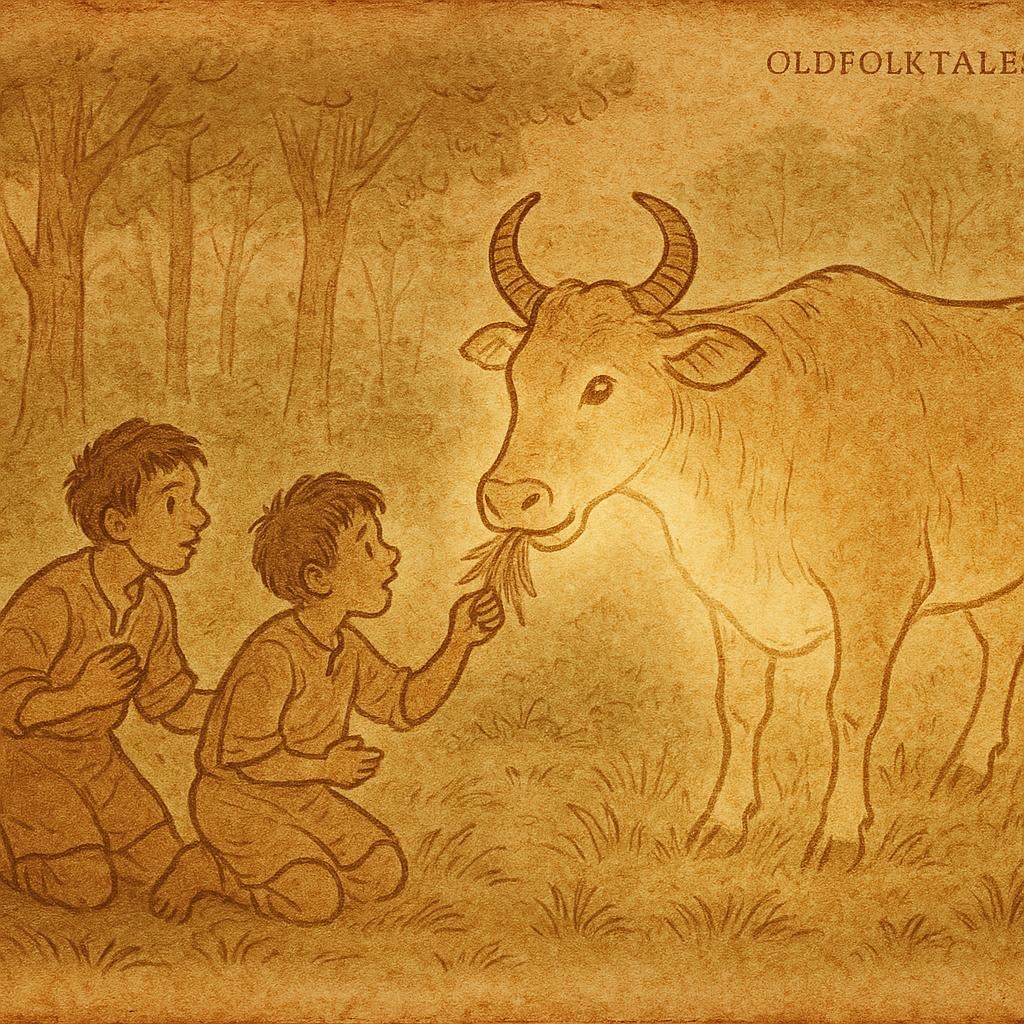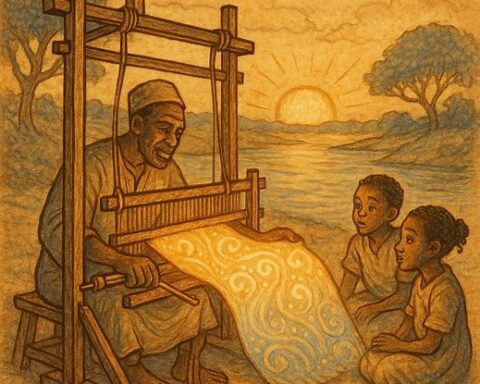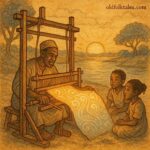Once upon a time, in the Gambela region of Ethiopia, there lived a man with two wives. One day, his first wife became gravely ill. Knowing the end was near, she called her two sons to her side and spoke softly through her pain.
“My dear children,” she whispered, “soon I will leave this world. Kiss me now and say goodbye.”
Tears rolled down the boys’ cheeks. They clung to her, heartbroken.
“Mother,” they cried, “what will become of us? Our father’s second wife hates us. If she refuses to give us food, how shall we survive?”
Their mother, though weak, managed a gentle smile.
“Do not despair,” she told them. “When hunger strikes, go into the forest. There, someone will care for you.”
Not long after, the woman died, and her sons wept bitterly. In time, their grief turned to hunger, so they went to their stepmother.
“Please,” they begged, “share your food with us.”
But the second wife sneered.
“What? Feed you? I have barely enough for my own children. Go away! You’ll get nothing from me.”
READ THIS: Achok Goes Fishing: An Ethiopian Folktale from Gambela
The younger boy began to cry. “Brother, I’m so hungry. I can’t bear it.”
The elder took his hand firmly. “Remember what Mother told us. We will go to the forest.”
And so they did. There, in the quiet of the trees, they discovered a cow, gentle and kind, with eyes that glowed like embers at dusk. Every day, she gave them food, and soon their hunger was gone.
Back at home, their stepmother’s children grew suspicious.
“Why are you never hungry? Who feeds you? And why do you disappear into the forest each day?”
One morning, the eldest stepsister demanded, “I will go with you today. I must know your secret.”
The brothers tried to dissuade her.
“No, you’ll be tired and hungry. We have no mother to feed us, so we simply wander until we’re weary.”
But she pressed and pressed until they relented.
All day they walked until at last they reached the cow. The elder boy hesitated, wanting to protect the secret, but the younger cried, “Brother, I cannot go on. Call the cow!”
So the elder called, and the cow came, giving them food. The brothers ate, while their stepsister looked on.
That night, she ran to her mother.
“I know their secret! There’s a cow in the forest that feeds them.”
The next day, the stepmother turned to her husband.
“Husband, I am with child. I need strong food so my baby will be strong. Bring me the cow that feeds your children.”
“What cow?” he asked uneasily.
But she grew angry. “Do not lie. I know the truth. Bring me that cow!”
Reluctantly, the man went into the forest and brought the cow.
“Kill it!” demanded his wife. “I must eat its meat.”
He resisted at first but finally obeyed, raising his knife. Yet when he cut the cow’s throat, the animal did not die.
“Then I will kill your children!” the wife threatened.
Horrified, the boys cried, “Let the cow die!” And at once, the cow fell lifeless.
The wife tried to skin it, but the hide clung fast. Again, she threatened the children. Again, they yielded, and the skin came off.
She placed the meat in a pot, but it refused to cook. Once more she cursed the children. And again they gave in, and the meat cooked.
When she tried to lift the pot, it would not move. Furious, she shouted her threat, and the children relented. The pot lifted, and the woman feasted.
The brothers wept. “Our stepmother has destroyed our cow. Now she will destroy us. We must flee.”
So they ran into the forest. In their haste, they became separated. One wandered far away; the other remained near the village.
Years passed. The elder brother grew into a strong young man. One day, he met the chief’s most beautiful daughter and fell in love. She loved him too, and they met in secret.
At that time, war raged between villages. Each night, the young man fought beside the chief, defending the people bravely.
“Who is this stranger who aids me each night?” the chief wondered.
“Ask your daughters,” his men suggested.
So the chief summoned them. “Bring your husbands and lovers before me,” he commanded.
All the daughters obeyed. Among them sat the young man, stricken with smallpox. Weak and ashamed, he stayed apart, head bowed.
But the chief’s most beautiful daughter ran to him and took his hand.
“Daughter!” the chief roared. “Stay away! He has smallpox.”
“But father,” she pleaded, “this is the man who fights beside you. He is brave. I love him. I will marry him.”
The chief grew furious, but then the crowd gasped. His head had begun to swell, growing larger and larger before their eyes.
Terrified, the chief touched his face. It was true.
“Father,” said his daughter urgently, “if you let me marry him, your head will return to normal. If you refuse, it will grow until it bursts.”
The people cried out, “Let her marry him! Save yourself!”
At last, the chief agreed. Instantly, his head returned to its normal size.
And so the young man and the chief’s daughter married, and they lived in peace and happiness.
Moral Lesson
This tale teaches that cruelty and envy destroy, while love, courage, and truth preserve life. The stepmother’s greed ended the magic cow’s blessings, yet the elder brother’s bravery and the daughter’s steadfast love restored hope. True strength is found not in power or deception, but in kindness, resilience, and loyalty.
Knowledge Check
Who gave the children food after their mother’s death?
A magical cow in the forest.
Why did the stepmother demand the cow?
She claimed she needed its meat to strengthen her unborn child.
What happened whenever the stepmother threatened to kill the children?
The children gave in, and the cow’s death, skinning, and cooking proceeded.
What illness struck the elder brother when he met the chief’s daughter?
He was afflicted with smallpox.
What caused the chief’s head to swell uncontrollably?
His refusal to let his daughter marry the young man.
What key values does the story highlight?
Kindness, resilience, the dangers of greed, and the triumph of true love.
Source: Ethiopian folktale, Gambela region






